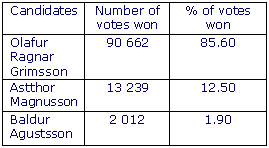Analysis
News
Corinne Deloy,
Fondation Robert Schuman,
Helen Levy
-

Available versions :
EN

Corinne Deloy
Fondation Robert Schuman
Helen Levy
At the start of January 2008 during his New Year's speech President of the Republic of Iceland, Olafur Ragnar Grimsson announced that he would be standing again for the position of Head of State at the end of his third term in office which comes to an end in July.
An Iceland tradition has it that no rival stands against the president in office who says that he wants to run for another term in office. The present Head of State was elected for the first time on 29th June 1996 with 40% of the vote, then he was re-elected in June 2000 without the organisation of an election.
In 2004 although he had said he wanted to undertake a third term in office two other people came forward as candidates: businessman and pacificist, Asthor Magnusson who also stood in the presidential election in 1996 when he won 2.6% of the vote and Baldur Agustsson, a businessman who successfully made his fortune as head of a security company in the UK, but who was unknown to the public at large. Olafur Ragnar Grimsson was re-elected with 86.50% of the vote.
This year, as in 2000, Iceland will not organise a presidential election since no other candidate has stepped forward against Olafur Ragnar Grimsson. The deadline in terms of presenting a candidature was set at 23rd May at midnight.
The Presidential Function
The function of President of the Republic is an honorary one. Essentially he represents moral authority amongst the citizens and is often qualified as the "king without a crown". He is compared to the Danish king in the period between the two world wars.
The length of the presidential mandate is four years and the number of mandates is unlimited. The far left leader Left-Green Movement (VG), Steingrimur Sigfusson using the Finnish model as his inspiration suggested limiting the number of presidential mandates to three. Thorgerdur Katrin Gunnarsdottir, Education Minister and Vice-President of the Independence Party (SJ) led by Prime Minister Geir H Haarde, said she disagreed maintaining that in her opinion such a restriction was unnecessary.
Any candidate standing for president has to collate the signatures of 1500 people in order to run for the electorate's vote. The election takes place in one round and the candidate who comes first is elected President. Since the election is not political voters choose a personality, who, for their part, tries to rally the citizens and appear as a symbol of national unity.
In 2000, Olafur Ragnar Grimsson wanted the first renewal of his mandate to be an occasion to open debate on the role played by the President. On 2nd June 2004 he vetoed the law on the media approved previously on 25th May by Parliament. The presidential veto, a first in the country's history shook the island to its core. The law on the media aimed to fight against monopolies which might restrict consumer freedom on an economic and political level. Olafur Ragnar Grimsson, who recalled the importance of the freedom of expression and need for Iceland to have free media justified his decision since the law approved by Parliament was extremely controversial. According to article 26 of the Constitution the text should have been submitted to referendum but the law was finally repealed on 22nd July 2004.
Since then, Olafur Ragnar Grimsson seems to have decided to play a traditional role as Head of State. The parenthesis that had been opened now seems to be firmly shut.
Aged 65 and from Isafjordur (north west of Iceland), Olafur Ragnar Grimsson is a graduate of political science of the University of Manchester (UK); he was incidentally the first Icelander to achieve a doctorate in this discipline. Professor of Political Science at the University of Iceland he also ran the Icelandic TV and Radio between 1966 and 1971. As a member of the Young Progressives from 1966 to 1973, Olafur Ragnar Grimsson then entered the Althing (Parliament) in 1974 when he stood on a list run by the People's Alliance, a party he chaired from 1987 to 1995. Finance Minister between 1988 and 1991 in the government led by Steingrímur Hermannsson, he was elected President of the Republic on 29th June 1996 then again in 2000 and on 26th June 2004.
After Asgeir Asgeirsson (1952-1968) and Vigdis Finnbogadottir (1980-1996), Olafur Ragnar Grimsson is the third Head of State to be elected for a fourth term in office which he will officially start on 1st August next.
Reminder of the presidential election results 26th June 2004 in Iceland
 Source: Morgunbladed
Source: MorgunbladedOn the same theme
To go further
Elections in Europe
Corinne Deloy
—
14 October 2025
Elections in Europe
Corinne Deloy
—
7 October 2025
Elections in Europe
Corinne Deloy
—
7 October 2025
Elections in Europe
Corinne Deloy
—
9 September 2025

The Letter
Schuman
European news of the week
Unique in its genre, with its 200,000 subscribers and its editions in 6 languages (French, English, German, Spanish, Polish and Ukrainian), it has brought to you, for 15 years, a summary of European news, more needed now than ever
Versions :



